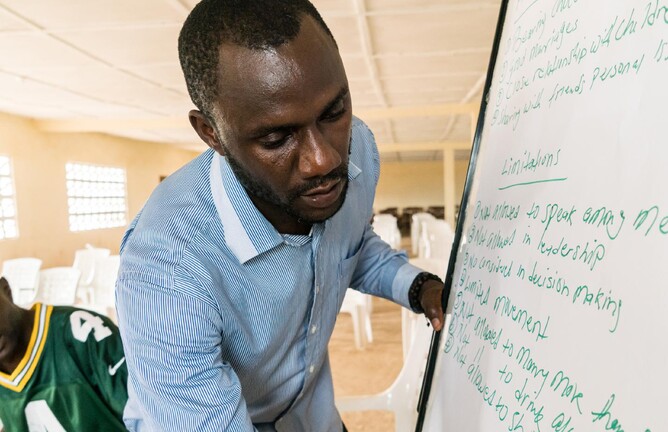Ten men from ten communities sit in a circle discussing the lists they have just made: privileges and limitations for men and women. The two hand-written lists on the board are clearly out of balance. Fourteen privileges listed for men; four for women. Three limitations for men; ten for women.
One participant raises his hand to add another “privilege” to the men’s list: they can beat their wives. The training facilitator, Albert Bundoo thinks this is worth discussing. One man thinks that women have recourse if they are beaten, but Albert says, “Let’s be realistic. In your community what happens when a man beats his wife?” There’s a pause, and finally someone says, “Nothing.”
In a program developed to empower adolescent girls, the Danish Refugee Council attempts to change the attitude of men toward women.
Albert continues. “If we have a community where one group is benefiting while the other group is lacking, do you think that community is fine, or is there a problem?” The men agree it’s a problem. “What can we do to end violence against women and girls, and create a community where women and girls have access to equal opportunity and choices?”
After several men respond, one says, “First I have to change myself and the perception I have against women. From there I should begin to talk to others on how they can change.”
Empowering Women and Girls
It’s the first session for these men who have been chosen from each of their communities to participate in the week-long training on ending violence against women and girls. Each of the participants will return to their community to initiate more men’s groups and train them on women’s rights and protection issues. Its just one part of a much larger program in Lofa County, Liberia called “Advancing Adolescent Girls” and initiated by Danish Refugee Council (DRC).
The project, which has been successfully completed in three other Liberian counties, aims to address the issues of adolescent girls in Liberia who are the most vulnerable to human rights violations and gender inequality. Sexual abuse, domestic violence, exploitation, very limited educational opportunities, early marriage and teenage pregnancy are prevalent.
DRC’s Advancing Adolescent Girls program addresses these issues through back-to-school programs, literacy classes for older dropouts, self-defense classes, building youth centers for girls, youth dialogues, gender equality training and leadership training. The overriding purpose of the program is to help produce a generation of girls that has grown up in safety, has access to education and social resources, and has their own voice and standing in their communities.
But DRC recognizes that men’s attitudes toward women are an enormous part of the issue.
“What we found was that one of the best ways to promote community-wide change and awareness for women’s rights is to make sure that there’s a strong men’s support to back them,” explains Brian Brady, DRC Program Manager in Lofa County. “You really have to tackle both sides. You can empower all you want, but you need the backing of the whole community.”
The Training
The men chosen for this particular training have some level of leadership in their communities. SOAP, a local NGO, implements this part of the DRC program, specializing in behavior change interventions in rural communities. Using trained facilitators, the men are engaged in deep-rooted questions on gender roles and norms using discussion, self-exploration, and exercises that often reveal what they might not want to admit – that they must personally change before they can expect to change the attitudes of men in their communities.
One exercise on this first day placed some men in the shoes of women. The facilitators passed out cards with random numbers written on them—some with zero, others with 2, 3, or 4 representing to the trainers, but without the knowledge of the men, how many times each could contribute to the discussion. If someone with the number zero tried to speak they were shut down or ignored. After the exercise, the men discussed how it felt to be shunned.
Later, a thought struck thirty-three year old William Bayron and he said to the trainers, “DRC is asking us to change ourselves before we change the community. I see myself in this. It’s very difficult to change. To teach a monkey a new trick is very hard. Mr. Monkey who used to jump, you tell him not to jump now. It’s not easy.”
The project includes back-to-school programs, literacy classes for older dropouts, self-defense classes, building youth centers for girls, youth dialogues, gender equality training and leadership training.
MAF
The DRC base in Foya opened in February of 2016, although other bases in Nimba and Maryland Counties have been operating for several years. As with most places on the far edges of Liberia, getting to and from the capital by road is long and painful on dirt roads that turn to mud in the rainy season.
Brian, who must travel between the cities regularly, says, “I take MAF whenever I can because it’s much more convenient, direct from Monrovia to Foya. I took the road once. I made it in one day, but that was in the dry season. Have you been up here in the rainy season? I’m not kidding when I say there’s mud higher than the car. And even sometimes the main road from here to Voinjama is almost impassable.” The MAF flight, by comparison, takes only one hour and Lofa County is included as one of the MAF northern shuttles.
